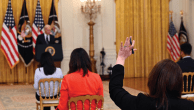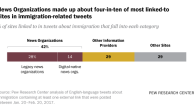About the News Interest Index
The News Interest Index is a weekly survey conducted by the Pew Research Center for the People & the Press aimed at gauging the public’s interest in and reaction to major news events.
This project has been undertaken in conjunction with the Project for Excellence in Journalism’s News Coverage Index, an ongoing content analysis of the news. The News Coverage Index catalogues the news from top news organizations across five major sectors of the media: newspapers, network television, cable television, radio and the internet. Each week (from Monday through Sunday) PEJ compiles this data to identify the top stories for the week. (For more information about the Project for Excellence in Journalism’s News Coverage Index, go to www.pewresearch.org/pewresearch-org/journalism.) The News Interest Index survey collects data from Friday through Monday to gauge public interest in the most covered stories of the week.
Results for the weekly surveys are based on landline telephone interviews among a nationwide sample of approximately 1,000 adults, 18 years of age or older, under the direction of Infogroup/ORC (Opinion Research Corporation). The sample is produced by ORC from data provided by Marketing Systems Group. Interviews are conducted in English. Data are weighted using an iterative technique that matches gender, age, education, race/ethnicity, region and population density to parameters from the March 2009 Census Bureau’s Current Population survey. Sampling errors and statistical tests of significance take into account the effect of weighting.
The following table shows the error attributable to sampling that would be expected at the 95% level of confidence for different groups in the current survey, conducted April 1-5, 2010 (with no polling conducted Easter Sunday, April 4, 2010):

In addition to sampling error, one should bear in mind that question wording and practical difficulties in conducting surveys can introduce error or bias into the findings of opinion polls.




